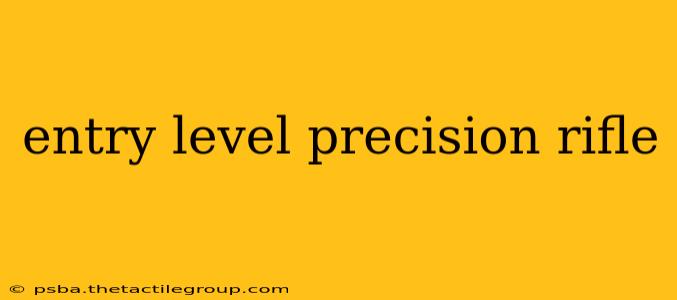Precision rifle shooting is a rewarding hobby, but the high cost of entry can be intimidating for newcomers. This guide will explore excellent entry-level precision rifles, helping you find an accurate and reliable platform without breaking the bank. We'll cover key features to look for, budget considerations, and popular choices to get you started on your journey to long-range accuracy.
Understanding the Needs of a Beginner Precision Rifle Shooter
Before diving into specific models, it's crucial to understand what makes a good entry-level precision rifle. You don't need top-tier, custom components right away. Focus on these essential elements:
- Accuracy: The rifle should be capable of sub-MOA (minute of angle) accuracy with factory ammunition. This means grouping shots within one inch at 100 yards.
- Reliability: Choose a rifle known for its robust construction and dependable function. Malfunctions can disrupt your practice and learning process.
- Ergonomics: A comfortable and well-balanced rifle makes shooting more enjoyable and improves your accuracy. Consider the stock's adjustability and overall fit.
- Affordability: Entry-level implies a budget-conscious approach. Prioritize a rifle within your price range that doesn't compromise essential features.
Key Features to Consider When Choosing Your First Precision Rifle
Several key features differentiate a precision rifle from a hunting rifle or sporting rifle. Here's what to look for:
- Bolt Action: Bolt-action rifles are generally preferred for precision shooting due to their inherent accuracy and ability to handle higher pressures.
- Free-Floating Barrel: A free-floating barrel prevents contact with the stock, minimizing vibrations and improving accuracy.
- Adjustable Stock: An adjustable stock allows you to customize the length of pull and cheek weld for a perfect fit, crucial for consistent shooting.
- Quality Trigger: A crisp, clean trigger break is essential for precision shooting. Consider rifles with adjustable triggers.
- Threaded Barrel: A threaded barrel allows you to mount a suppressor or muzzle brake, both beneficial for managing recoil and sound.
Popular Entry-Level Precision Rifle Options
The market offers various excellent options for entry-level precision rifles. Researching individual models based on availability and reviews is vital. Here are some brands and categories to consider:
Budget-Friendly Options (Under $1000):
- Savage Arms: Known for their accuracy and affordability, Savage rifles, such as the Savage Axis XP or the Savage 110, frequently appear as excellent starting points. These often come with features like adjustable triggers and AccuStock.
- Mossberg Patriot: Another strong contender in the budget-friendly segment, the Mossberg Patriot offers solid accuracy and reliable performance at a competitive price.
Mid-Range Options ($1000-$1500):
- Tikka T3x: Tikka rifles are renowned for their accuracy and smooth actions. The T3x is a popular choice for those seeking a step up in quality and features.
- Howa 1500: Howa rifles offer excellent value for their price, known for their accuracy and smooth bolt actions.
Beyond the Rifle: Essential Accessories for Precision Shooting
Remember that the rifle is only part of the equation. Essential accessories include:
- Optics: A good quality scope is crucial for precision shooting. Choose a scope with sufficient magnification and clarity for your intended range.
- Ammunition: High-quality ammunition is vital for consistent accuracy. Experiment to find what your rifle shoots best.
- Bipod: A stable bipod is essential for supporting the rifle and improving accuracy.
- Shooting Rest: A shooting rest provides additional stability, particularly at longer ranges.
Conclusion: Getting Started in Precision Rifle Shooting
Choosing your first precision rifle is an exciting step into a rewarding hobby. By considering the features discussed above, researching different models, and understanding your budget, you can find the perfect rifle to start your journey towards long-range accuracy. Remember to prioritize safety and practice regularly to hone your skills. This guide provides a starting point; further research and seeking advice from experienced shooters are always recommended.

